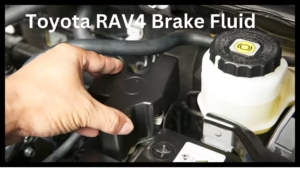
Have you been searching for ways to avoid the potentially dangerous consequences of losing fluid and not being able to stop your car? But what is the so-called “brake fluid” and what does it do?
Brake fluid is a liquid chemical solution that helps maintain your car’s braking system. It increases the force of your foot on the pedal, allowing the vehicle to stop effectively. In this guide, I will explain everything you need to know about brake fluid and how to change it to ensure the optimal performance of your vehicle. So, let’s get to it!
Why Should I Change My Brake Fluid?
Changing your vehicle’s brake fluid or oil is important. If you don’t, the brake fluid may lose its effectiveness, decrease in quantity, or absorb dirt and water in it. As a result, you may experience a decreased braking force. This is arguably one of the most terrible things to experience on the road.
Pretty damn bad, right! This is why changing the brake fluid, as you may call it, is very important. You may either change it yourself or go to a skilled mechanic to do the job for you.
Checking The Brake Fluid
Checking the brake fluid is one of the easiest things to do. Luckily, it doesn’t require any mechanical assistance. Simply follow the steps below:
- Pull the bonnet release lever
- Open the hood of the RAV4
- Look at the reservoir towards the further edge
- If you don’t see the minimum line, wipe it clean
- The fluid’s level should be between minimum and maximum levels
It all should look something like this:
If you notice the fluid has changed and discolored from yellow to a darker color, it may be contaminated. Conversely, the fluid may have absorbed in water or moisture. Either way, you need to change it either yourself or take your vehicle to a certified mechanic.
How to Change the Brake Fluid in Your Toyota RAV4
Changing the brake fluid is very important. However, it is hard to textually communicate exactly which steps to undertake to do so. Therefore, I suggest you watch this video for a visual demonstration.
Even though the video demonstration may seem easy, I recommend that you don’t undergo this procedure yourself. This is especially true for those of you who don’t have any prior experience. Taking your vehicle to a professional is the best course of action.
How Often Should The Brake Fluid Be Changed?
Abiding by what Toyota recommends helps ensure the peak performance of your RAV4 brakes. As the manufacturers instruct, the brake fluid or oil should be checked at least once every 6 months or every 5,000 km. Here is what to look for and what to do about it:
- If you see that the fluid level is low, top off the tank and add more.
- If the fluid seems to have changed color too much, flush out the dirty liquid and replace it entirely.
Just like motor oil or engine oil, brake fluid also changes color with use. A new brake fluid should be crystal clear with a light yellow hue.
Over time, it will turn dark brown or black, and that’s how you know it’s time to drain and replace it.
Moisture In Brake Fluid
The moisture in the brake fluid can go unnoticed with a visual inspection. The water absorbed in it can drop its boiling point. And, when the engine produces more heat than its boiling point, the water then turns into steam. This results in a reduction in the overall volume and hence gives you a mushy brake problem. So, what is the solution?
Testing Brake Fluid (Yourself)
Did you know that you can cheaply get brake fluid testers online that help to determine whether or not your brake fluid has moisture locked in it and hence needs changing? Yes, you read that right.
A simple $10 investment in these testers can save you immensely. These simple devices help you detect moisture locked in the fluid. The red lights on these devices light up, signaling a need for changing the oil. You can also clean the small rods and do a double test to ensure a verified reading.
Be smart, order a brake fluid tester from Amazon or any other online store, and save yourself the hurdle of wasting your time and money.
Note: Since this device uses the principles of conductivity to measure the amount of moisture, if you use it to measure other types of fluids that contain factory-added metals, you may get a false reading of those fluids. This is because the device will confuse the conductivity as a marker for water instead of the metals.
Signs of Fluid Level Drops
If everything in your RAV4 system is going great, you won’t need to be worried about topping off the reservoir. This is because the fluid does not exactly get “used up” anywhere. It simply travels from the reservoir down to the calipers, helping the brake pads be squeezed against the tires every time you apply the brakes.
However, you may be experiencing a longer stopping time is required to bring your vehicle to a stop. This should be cause for concern that you need to be aware of. So, I’m here going to list down all of the reasons why brake fluid levels drop as well as their telltale signs:
- Leaking in the system, evident by fluid leaks beneath the car
- Wearing out of the brake pedals, evident when sounds while braking
- The thinning of the brake pads, evident by inspecting between wheel spokes
- Loosening of calipers, evident by leaks beneath the car
Replacement Cost
The cost of replacing your RAV4’s brake fluid depends on where you seek this service. But, typically, changing the fluid will costs an average of $80 to $130. Prices are based on national averages for all vehicles and do not include taxes, fees, or price variations based on make and model.
Note: Working with a local mechanic near you can help keep costs down. Expect a price in the upper end of this range if you go to the dealership.
Types of Brake Fluids To Use
All Toyota RAV4 vehicles, regardless of model year, are compatible with the following brake fluids:
- SAE J1703
- FMVSS No. 116 DOT3
The last generation of Toyota RAV4s manufactured between 2019 and 2025 is also compatible with:
- SAE J1704
- FMVSS No. 116 DOT4
The Best Brake Fluid
Both DOT 3 and 4 are great options as they maintain efficient performance under a range of conditions. But you might still be scratching your head as to which one to choose. The suitability of the oils comes down to your needs. So, look at the following points and see which one meets them:
The main difference between DOT 3 and DOT 4 brake fluid is water absorption. DOT 3 tends to absorb less water from the air than DOT 4.
This means you will need to change your fluid less often. However, DOT 4 does have its advantages. It has higher dry and wet boiling points. This makes it a safer choice for higher temperatures.
Note: Do not mix different types of Toyota RAV4 brake fluid, as this can cause damage to the brakes. Stick to the types listed above or consult a professional if you are unsure which one to choose for your car.
Does the Hold Button Effect Brake Fluid?
The RAV4 hold button is responsible for keeping the car in one place regardless of consistent pressure on the brake pedal.
Using the hold button doesn’t directly affect brake fluid levels. However, its frequent use may cause an accelerated wearing of the braking system. For this reason, I encourage you to make regular checks to ensure the health of your braking system.
FAQs
Do Toyotas need special brake fluid?
No, the fluid Toyota has produced is perfect for your specific vehicle and its needs. It also provides decent protection against metal corrosion. Therefore, I always recommend using Toyota-specific brake fluid.
Does Toyota recommend using the DOT 3 brake fluid?
Yes, Toyota recommends using the Toyota Heavy Duty Brake Fluid DOT 3. This is a useful oil when flushing the system.
How do you tell if brake fluid is bad?
If it feels darker than usual, your brake fluid might be contaminated. It might also show an above-2 percent moisture percentage in a brake fluid tester. These signs indicate that the brake fluid needs to be changed.
How can I know my brake fluid is below the minimum?
If the brakes feel soft or like you're stepping in quicksand, you're probably low on fluid. Also, any time you hear a strange sound when you brake should be a cause for concern.
What color is Toyota brake fluid?
The color of the Toyota brake fluid is clear, with a yellow tint in it. It also doesn’t have any contaminations.
How much brake fluid do I need?
Most vehicles roughly require about 32 ounces or one quart of brake fluid. This is about 1 liter of fluid.
Can I replace DOT 3 with DOT 4?
No, although DOT 3 and DOT 4 oils are both glycol-based. They're great with ABS brakes in modern SUVs and trucks. DOT 4 has a higher boiling point, which can make it more favorable to DOT 3.
Can I mix DOT 3 and DOT 4?
No, you can’t. The DOT 3 and DOT 4 may both be glycol-ether-based but shouldn’t be mixed together. DOT 4 has a higher boiling point, so depending on the application, it may be necessary to use that instead of DOT 3. Do not mix DOT 5 with any of them either, as it is silicone-based.
What vehicles use DOT 4 brake fluid?
There are several different variations of DOT 4. It is used in some domestic vehicles. DOT 4 Plus is usually used in cars like Volvo and Mercedes. The Low Viscosity variant of DOT 4 is consumed by some BMW models.
How long is DOT 3 brake fluid good for?
In ideal conditions, a sealed bottle of brake fluid can last for up to two years. If it is opened, it tends to absorb moisture quickly; therefore, I recommend that you use a brand-new bottle every time you change the oil.
Sources
The brake fluid’s level of moisture is described in more detail in the Brake fluid tester video. And the information on which fluid is better was collected from the following webpage, DOT 3 Vs DOT 4 Brake Fluid.
Conclusion
The brake fluid, or oil, is a necessary component in a smooth and safe drive. This is why Toyota recommends RAV4 owners check their brake fluid every 6 months or 5,000 miles. If the oil is lower than the minimum quantity, top it off. And, if it is discolored or contaminated, ensure an immediate change of the fluid. If, however, the brake oil has absorbed water, you may need a brake fluid tester to see if your brake fluid needs changing.
The SAE J1703 or FMVSS No. 116 DOT 3 are both excellent fluids for all models of the Toyota RAV4. These are available for an average of $80-$130 and are the recommendation of Toyota.
If you are concerned about maintaining the health of your RAV4, you may also read our post on reading and setting the tire pressure.
